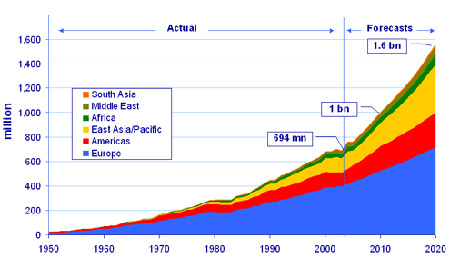E-commerce in the sphere of tourism and traveling is growing at a brisk pace. Continuous functionality enhancements stipulate significant investments in the development of web portals. A successful online travel portal provides a steady stream of traffic, wherein user visits can be converted into sales.
According to the United Nations World Tourism Organization’s (UNWTO) research Tourism 2020 Vision, international arrivals are expected to reach nearly 1.6 billion by the year 2020. Of these arrivals in 2020 all over the world, 1.2 billion will be intraregional and 378 million will be long-haul travelers, highlighting the critical role that travel software development plays in managing and optimizing this vast movement of people globally.
The above-mentioned research also suggests that by 2020 the top three tourist receiving regions will be Europe (717 million tourists), East Asia and the Pacific (397 million), and the Americas (282 million), followed by Africa, the Middle East, and South Asia.
In order to turn visitors into engaged travelers, an online travel portal can contain the following features:
- Search for flights, hotels, hostels, cars, package tours, cruises, etc.
- Easy booking flow combined with a user-friendly and intuitive interface.
- Automated sending of Emails, E-tickets details, SMS confirmation messages, as well as alerts about flight postponements and cancellations.
- A mobile version of the portal.
- Secure processing of payments with the help of credit cards.
- Multi-lingual and multi-currency support.
- Convenient account management with user activity history.
- The option of getting travel insurance.
- Customer reviews and ratings of tourist sites, services, and destinations with regular updates.
- Useful destination information, like the weather forecast, local maps, photographs, airport parking details, driving instructions, etc.
- Up-sell opportunities (for example, if a customer purchases a car rental for a specific city, it is also possible to offer tickets to popular tourist attractions).
- Real-time support for customers during the purchase process (online chat, phone, and email support, or even a call-center).
Source: World Tourism Organization (UNWTO), Tourism 2020 Vision
The creation of a tourist portal implies certain challenges, like online security threats, the possibility of financial loss due to outages and slower response time, adapting to the rapidly changing market scenario, and ever-increasing customer expectations. In addition to that, a sophisticated travel portal should have an effective content management system (CMS) and must be directly interfaced with reservation systems of travel suppliers, such as hotels, airlines, car rental agencies. It should also create a consolidated record for storing all aspects of a traveler’s itinerary.
Quick and easy to access travel portals with optimized functionality will always be of great value to travelers, especially to those people who are often busy or do not have much time at their disposal. Therefore, such web portals make it possible to reach a broader audience and ultimately generate more profit.
Industries and Technology Areas:
Industries: traveling, tourism, hospitality, airline industry, car rental
Technology Areas: web portal, custom software development, mobile app development, travel content management system (CMS)
Exploring the World Through Technology











